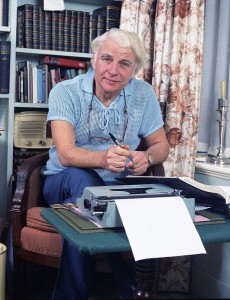 Irving Berlin sings “God Bless America” as part of a tribute to his eightieth birthday telecast on The Ed Sullivan Show on May 5, 1968. He wrote the song in 1918. It was first performed in 1938 and published the following year:
Irving Berlin sings “God Bless America” as part of a tribute to his eightieth birthday telecast on The Ed Sullivan Show on May 5, 1968. He wrote the song in 1918. It was first performed in 1938 and published the following year:
(This is the latest in a series of arts-related videos that appear in this space each Monday, Wednesday, and Friday.)


 So what about “China Doll”? Well, it turns out to be a strongly wrought story of considerable moral complexity, one that will hold your attention all the way to the brutal end. I can’t yet tell you whether it has the legs of “American Buffalo” or “Glengarry Glen Ross,” but I do know that I want to see it again—and while I believe Mr. Pacino has failed to do it justice, I’m still glad I got to see him give it a try.
So what about “China Doll”? Well, it turns out to be a strongly wrought story of considerable moral complexity, one that will hold your attention all the way to the brutal end. I can’t yet tell you whether it has the legs of “American Buffalo” or “Glengarry Glen Ross,” but I do know that I want to see it again—and while I believe Mr. Pacino has failed to do it justice, I’m still glad I got to see him give it a try. In today’s Wall Street Journal “Sightings” column I write about a long-forgotten but incomparably vivid stage memoir, Emlyn Williams’ George. Here’s an excerpt.
In today’s Wall Street Journal “Sightings” column I write about a long-forgotten but incomparably vivid stage memoir, Emlyn Williams’ George. Here’s an excerpt. Noël Coward, who knew Williams well, described his life as “the Cinderella story of all time.” Indeed, his childhood and youth, of which “The Corn Is Green” is a fictionalized account, border on the unbelievable. Born George Emlyn Williams in 1905 in a tiny coastal village in north Wales, he was the oldest son of a hard-drinking sailor turned pub-keeper and his prudish, long-suffering wife. Young George, as he was then known, might well have become a common laborer save for the fact that Sarah Grace Cooke, one of his schoolteachers, noticed that he was exceptionally bright and took him under her generous wing. (Bette Davis played her in the 1945 film version of “The Corn Is Green.”) Seven years later, he won a French scholarship to Oxford, where he started going to the theater obsessively and resolved to spend the rest of his life on stage. In 1927 he landed a supporting part in a West End hit called “And So to Bed,” writing a hit of his own, “A Murder Has Been Arranged,” three years after that. He never looked back.
Noël Coward, who knew Williams well, described his life as “the Cinderella story of all time.” Indeed, his childhood and youth, of which “The Corn Is Green” is a fictionalized account, border on the unbelievable. Born George Emlyn Williams in 1905 in a tiny coastal village in north Wales, he was the oldest son of a hard-drinking sailor turned pub-keeper and his prudish, long-suffering wife. Young George, as he was then known, might well have become a common laborer save for the fact that Sarah Grace Cooke, one of his schoolteachers, noticed that he was exceptionally bright and took him under her generous wing. (Bette Davis played her in the 1945 film version of “The Corn Is Green.”) Seven years later, he won a French scholarship to Oxford, where he started going to the theater obsessively and resolved to spend the rest of his life on stage. In 1927 he landed a supporting part in a West End hit called “And So to Bed,” writing a hit of his own, “A Murder Has Been Arranged,” three years after that. He never looked back.